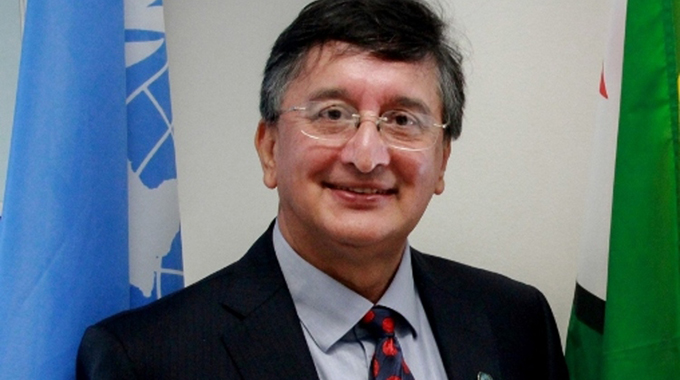52 000 in need of food aid in Chiredzi

Walter Mswazie Masvingo Correspondent
MORE than 50 000 people in Chiredzi District need food urgently following drought in the 2017/18 farming season caused by the El-Nino weather phenomenon, World Food Programme (WFP) Country director, Mr Eddie Rowe, has said.
In a statement released at the end of a two-day tour of UN-funded projects in Masvingo rural and Chiredzi, Mr Rowe said communities in the Lowveld were involved in a number of drought mitigating and resilient programmes under the WFP, as a number of them were affected by drought.
The delegation was led by UN resident coordinator Mr Bishow Parajuli and also included Food Agriculture Organisation (FAO) sub-regional coordinator for Southern Africa and representative to Zimbabwe Mr Alain Onibon; United Nations Development Programme resident representative Mr Georges Van Montfort; UNICEF Representative Ms Leylee Moshiri and World Health Organisation (WHO) representative Dr Alex Gasasira.
“The community asset building programme is running parallel to ongoing extended lean season targeted food assistance which was reaching some 52 000 people affected by drought in Chiredzi district,” said Mr Rowe.
He said the asset building programme was critical in sustaining drought-prone communities in Chiredzi and the country at large.
“These support across the country have been most critical in sustaining basic food,” he said. Mr Rowe said it had come to the delegation’s attention that a lot of communities were in distress due to climate change induced shocks.
“What we have observed for the past two day mission is that rural communities are in distress due to climate change,” he said. “We are happy that agencies are working together towards changing lives of communities.”
Mr Rowe said 90 percent of rural communities depended on rain-fed agriculture and remained susceptible to drought as a result of climate change.
“We came here to assess the extent at which communities are struggling to survive due to effects of climate change,” he said. “It has become evident that 90 percent of rural communities depend on rain-fed agriculture while only five percent thrive on irrigation.
“We want to see how we can assist the affected people up to next harvest in April 2010. Once one misses the harvest he or she will struggle to get to the next season and this is a deadly cocktail for any livelihood.”
Mr Rowe called on rural communities to utilise fertile land and water bodies to keep producing food all year round.
“There are three special ingredients here in Masvingo from which communities can produce enough food,” he said. “There is abundant land, there is fertile land and abundant water. We can assist communities to harness water through weir dams.
“With water and fertile land, communities will be food secure and that means there is a formula to mitigate drought in Masvingo.”








Comments